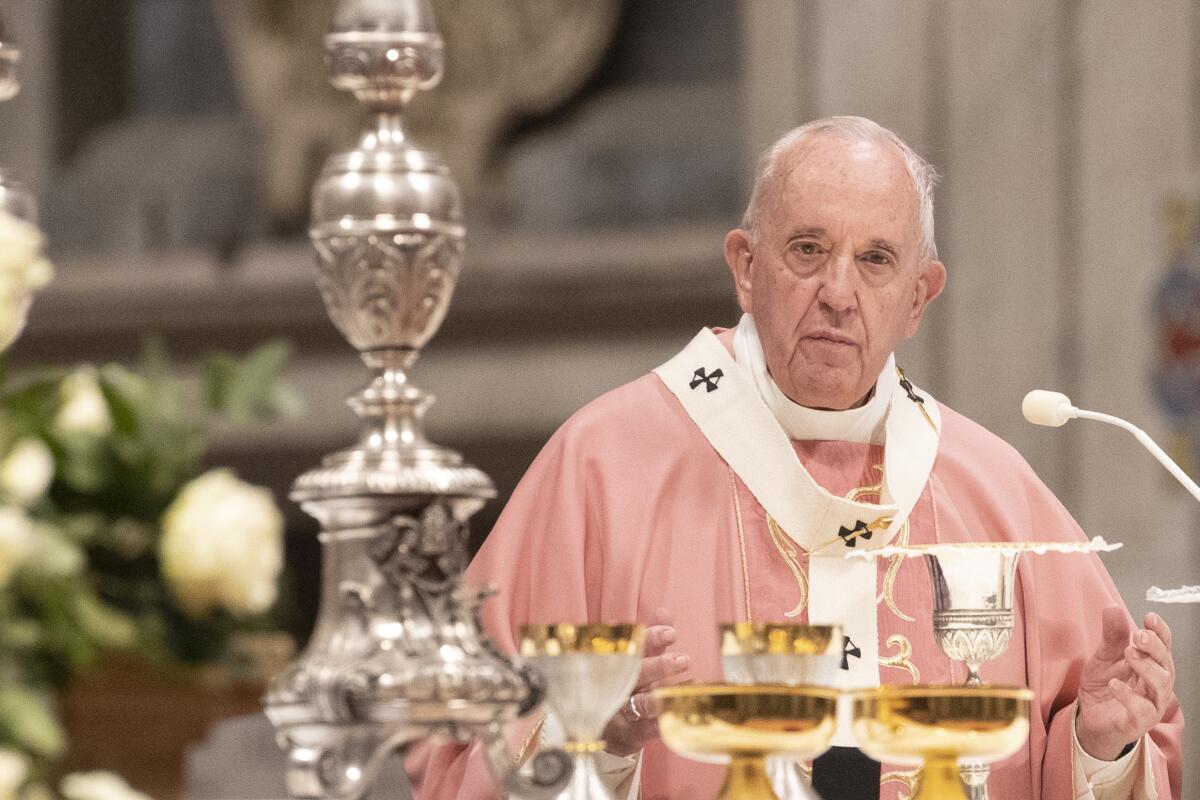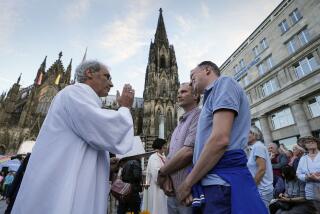Pope Francis removes shroud of secrecy from clergy sex abuse cases

- Share via
VATICAN CITY — Pope Francis abolished the use of the Vatican’s highest level of secrecy in clergy sexual abuse cases Tuesday, responding to mounting criticism that the rule of “pontifical secrecy” has been used to protect pedophiles, silence victims and prevent police from investigating crimes.
Victims and their advocates cheered the move as long overdue, but cautioned that the proof of its effectiveness would come when the Roman Catholic hierarchy is forced to respond to national inquiries, grand jury subpoenas and criminal prosecutors who are increasingly demanding all internal documentation about abusers.
“The carnival of obscurity is over,” declared Juan Carlos Cruz, a prominent Chilean survivor of clergy abuse and advocate for victims.
In a new law, Francis decreed that information in abuse cases must be protected by church leaders to ensure its “security, integrity and confidentiality.” But he said the rule of “pontifical secrecy” no longer applied to abuse-related accusations, trials and decisions under the Catholic Church’s canon law.
The Vatican’s leading sex crimes investigator, Archbishop Charles Scicluna, said the reform was an “epochal decision” that will facilitate coordination with civil law enforcement and open up lines of communication with victims.
While documentation from the church’s in-house legal proceedings will still not become public, Scicluna said, the reform now removes any excuse to not cooperate with legitimate legal requests from prosecutors, police or other civil authorities.
Francis also raised from 14 to 18 the cutoff age below which the Vatican considers pornographic images to be child pornography. The reform is a response to the Vatican’s increasing awareness of the prolific spread of online child porn that has frequently implicated even high-ranking churchmen.
The new laws were issued Tuesday, Francis’ 83rd birthday, as he struggles to respond to the global explosion of the abuse scandal, his own missteps and demands for greater transparency and accountability from victims, law enforcement and ordinary Catholics alike.
“The reforms are long overdue but symbolize an important step in the right direction,” said SNAP, a victims advocacy group. “Still right now they are only words on paper, and what needs to happen next is concrete action.”
The new norms are the latest amendment to the Catholic Church’s in-house canon law — a parallel legal code that metes out ecclesial justice for crimes against the faith — in this case relating to the sexual abuse of minors or vulnerable people by priests, bishops or cardinals. In this legal system, the worst punishment a priest can incur is being defrocked, or dismissed from the clerical state.
When he was a cardinal, Pope Benedict XVI had persuaded St. John Paul II to decree in 2001 that these cases must be handled by the Vatican’s Congregation for the Doctrine of the Faith and be dealt with under the “pontifical secret” rule. The Vatican had long insisted that such confidentiality was necessary to protect the privacy of the victim, the reputation of the accused and the integrity of the canonical process.
However, such secrecy also served to keep the scandal hidden, prevent law enforcement from accessing documents and silence victims, many of whom often believed that the “pontifical secret” rule prevented them from going to the police to report their priestly abusers.
While the Vatican has long tried to insist this was not the case, it also never mandated that bishops and religious superiors report sex crimes to police, and in the past it has also encouraged bishops not to do so.
According to the new instruction, which was signed by the Vatican secretary of state but authorized by the pope, the Vatican still doesn’t mandate reporting the crimes to police, saying religious superiors are obliged to do so where civil reporting laws require it.
But it goes further than the Vatican has gone before, saying: “Office confidentiality shall not prevent the fulfillment of the obligations laid down in all places by civil laws, including any reporting obligations, and the execution of enforceable requests of civil judicial authorities.”
The Vatican has been under increasing pressure to cooperate more with law enforcement, and its failure to do so has resulted in unprecedented raids in recent years on diocesan chanceries by police from Belgium to Texas and Chile.
But even under the threat of subpoenas and raids, bishops have sometimes felt compelled to withhold canonical proceedings given the “pontifical secret” rule, unless given permission to hand documents over by the Vatican. The new law makes that explicit permission no longer required.
More to Read
Sign up for Essential California
The most important California stories and recommendations in your inbox every morning.
You may occasionally receive promotional content from the Los Angeles Times.










